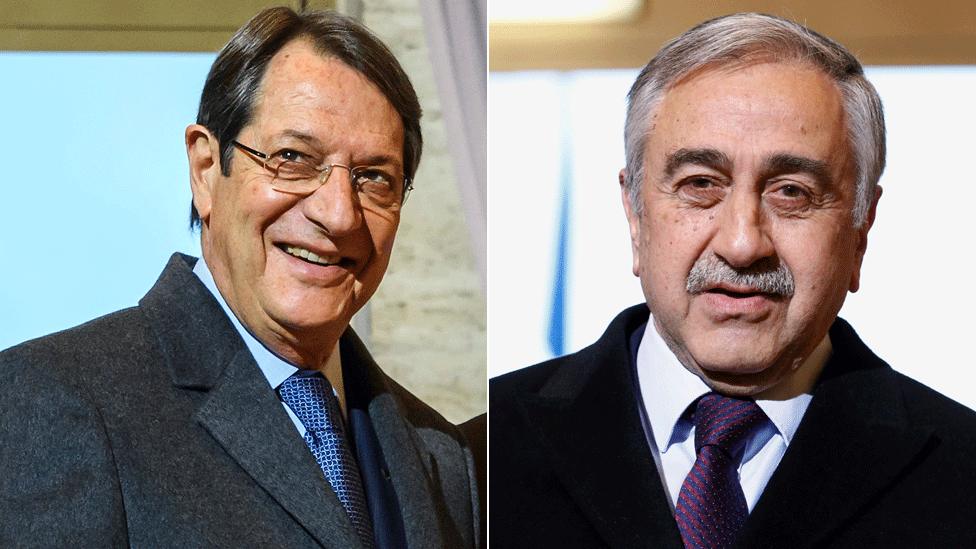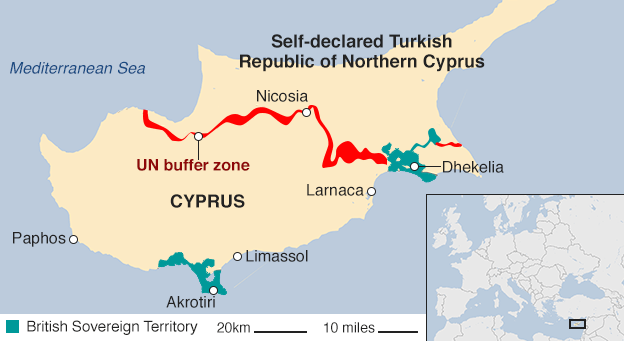Cyprus peace talks begin on future of divided island
- Published

Nicos Anastasiades (L) and his Turkish Cypriot counterpart Mustafa Akinci arrived separately for the talks
An end to decades of division in Cyprus is difficult but possible, a United Nations envoy has said as leaders met in Geneva to try to reach a settlement.
Espen Barth Eide praised the two sides for showing "a lot of courage" as they resumed attempts to reunify the island.
Greek Cypriot leader Nicos Anastasiades and Turkish Cypriot leader Mustafa Akinci met in the first of a series of meetings planned for this week.
Previous attempts to create a united but federal Cyprus have failed.

Read more

The idea behind these talks, which have been going on for some 19 months, would be to share power between the two communities, divided since 1974.
The leaders, said by diplomats to be genuinely committed to achieving a deal, talked for around four hours on Monday.
They have both acknowledged there are key issues that still need to be thrashed out.

UN envoy Espen Barth Eide (second left) praised Greek Cypriot President Nicos Anastasiades (far left) and Turkish Cypriot leader Mustafa Akinci (far right)
But if they make progress, leaders from the three countries that currently guarantee Cyprus's security - Britain, Greece and Turkey - will join the talks.
Cyprus has been split since Turkish troops invaded more than 40 years ago, following an Athens-inspired coup by Greek Cypriots seeking union with Greece.
The northern third of the island is inhabited by Turkish Cypriots and the southern two-thirds by Greek Cypriots.

The new UN Secretary-General Antonio Guterres, who has spoken of an "historic opportunity" for a breakthrough, will also be Geneva.
However, there are still significant stumbling blocks before a deal can be made.

What are the sticking points?
Property: Top of the agenda at Monday's talks was what should happen to the properties that Greek Cypriots had to abandon in 1974? Should they get the right to take their old homes back or be compensated and if so by how much?
Security: How can the security of the Turkish Cypriots be guaranteed if Turkey's estimated 30,000 troops leave? Greek Cypriots see them as an occupying force so should some stay or should Turkey retain the right to intervene?
Who would act as a guarantor of the deal. The EU of which Cyprus is already a member - or the UK, which has two military bases on the island?
Power and the role of the EU: There is talk of a rotating presidency but how would that work and could a Turkish Cypriot president really represent the country from time to time at EU summits?
Territory: How much more territory should Greek Cypriots gain to reflect the fact that they make up the majority of the island's population? UN peacekeeping forces estimate that 165,000 Greek Cypriots fled or were expelled from the north, and 45,000 Turkish Cypriots from the south, although the parties to the conflict say the figures are higher.
Any deal reached in Geneva would also have to be backed by both communities in separate referendums later this year. An earlier UN reunification plan was backed in 2004 by a majority of Turkish Cypriots but overwhelmingly rejected by Greek Cypriots.
- Published8 January 2017